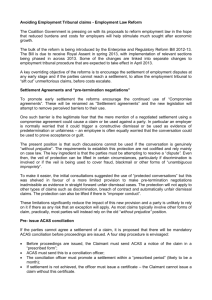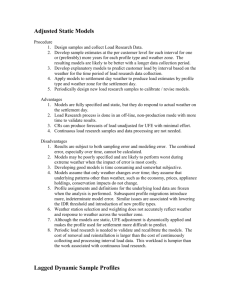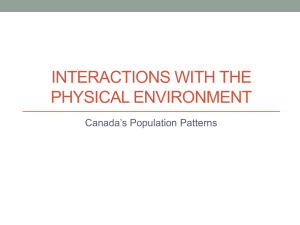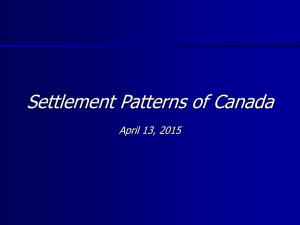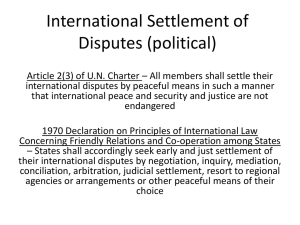Alexandra Goldie Presentation
advertisement
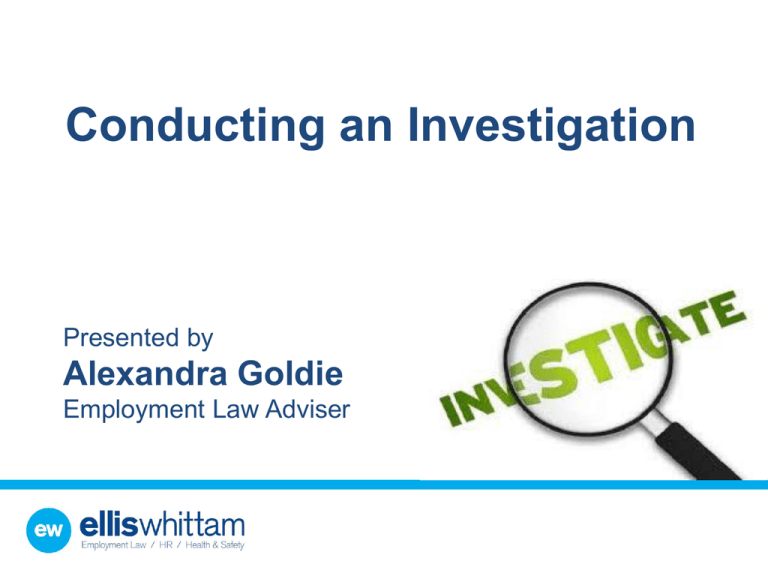
Conducting an Investigation Presented by Alexandra Goldie Employment Law Adviser Three Basic Principles • Be reasonable • Be consistent • Be nice Vicarious Liability Equality Act 2010, section 109 • Anything done by a person in the course of their employment must be treated as also done by the employer. • It does not matter whether that thing is done with the employer's knowledge or approval. Statutory Defence • It is a defence for the employer to show that it took all reasonable steps to prevent the employee: – from doing that thing; or – from doing anything of that description. How to Deal with a Complaint • Informal resolution • Formal complaints • Be seen to be taking action! Case Study 1 One department regularly send joke emails around to each other. The latest “joke” contains reference to goats and Africans, and contains crude cartoon like pictures. One of the recipients of this email, Kato, is from Africa. He doesn’t raise any issues, but his colleague and friend, Shona, does. Shona is from Edinburgh. Does the Company need to deal with this given Kato had no issue with the email? Conducting the Investigation • Separate investigating officer • Statements or minutes • Signed • Other relevant evidence • Interview accused person last What do you ask? • Who? • What? • When? • Where? • Why? Reluctant Witnesses • Employees reluctant to assist in an investigation. • Obligation of good faith or fidelity owed towards the employer. Anything else to consider? • Are there any special circumstances to be taken into account? • What evidence have you got? • Check informant’s motives • Consider possible explanations & check them out beforehand • Need to suspend? Case study 2 Josie is a packer on the biscuit production line. She comes into your office and claims that John, her line manager, has just touched her inappropriately from behind when she bent over to lift up a new empty box. She says that he often makes inappropriate sexual comments but this time he has gone too far. As HR Manager, what do you do? Whistleblowing • The information disclosed must, in the reasonable belief of the worker, tend to show that one of following has occurred, is occurring, or is likely to occur: – A criminal offence. – Breach of any legal obligation. – Miscarriage of justice. – Danger to the health and safety of any individual. – Damage to the environment. – The deliberate concealing of information about any of the above. Case Study 3 As John has been suspended pending an investigation into the allegations, Josie is being managed by David (John’s manager). He comes to you and says that Josie has a poor attitude and talks back to him. He says that she is not pulling her weight and is lazy. He wants to take disciplinary action. Do you have any concerns? Case Study 4 When meeting with John to investigate the allegations of sexual harassment, he says that this allegation has only been made because he told David (his line manager) that Josie had not been wearing her hair net or gloves when handling the biscuits despite being informally warned about this a number of times. What does this mean for your investigation? Negotiated Settlements • Settlement agreements are legally binding contracts that waive an individual's rights to make a claim covered by the agreement to an employment tribunal or court. • Settlement payment. • They are voluntary. • They can be offered at any stage of an employment relationship. Admissibility of Offers • The admissibility of settlement offers and discussions in legal proceedings is now regulated by two provisions: – the ‘without prejudice’ principle, and – the admissibility provisions on settlement agreements set out in section 111A of the Employment Rights Act 1996 (an amendment to the 1996 Act which was introduced in 2013). Protected Conversations • Section 111A of the Employment Rights Act 1996 • The offer made and any subsequent discussion about it may not be admissible as evidence in any subsequent unfair dismissal claim. • Provide a similar protection to the ‘without prejudice’ principle but apply only to: – settlement offers and discussions that relate to the ending of an employment relationship (pre-termination negotiations); and – unfair dismissal claims (including constructive unfair dismissal claims) brought to an employment tribunal. Without prejudice • ‘Without prejudice’ - a common law principle which prevents statements, whether written or oral, which are made in a genuine attempt to settle an ‘existing dispute’, from being put before an employment tribunal or other court as evidence in legal proceedings between those parties about that dispute. • In order for settlement discussions and agreements to be protected under the ‘without prejudice’ principle, there must be: – an ‘existing dispute’ between the parties and a genuine attempt to settle that dispute, and – no ‘unambiguous impropriety’ in the conduct of the parties during the settlement discussions. Recent Developments • Harassment of employees by third parties repealed. • Quality Solicitors CMHT v Tunstall (2014) Top Tips • General awareness • Equal Opportunities & Grievance Policies – Awareness – Training – Monitored – Followed! • Lead by example – Culture – Action – proactive not reactive • Audit trails • Seek advice Any Questions?
